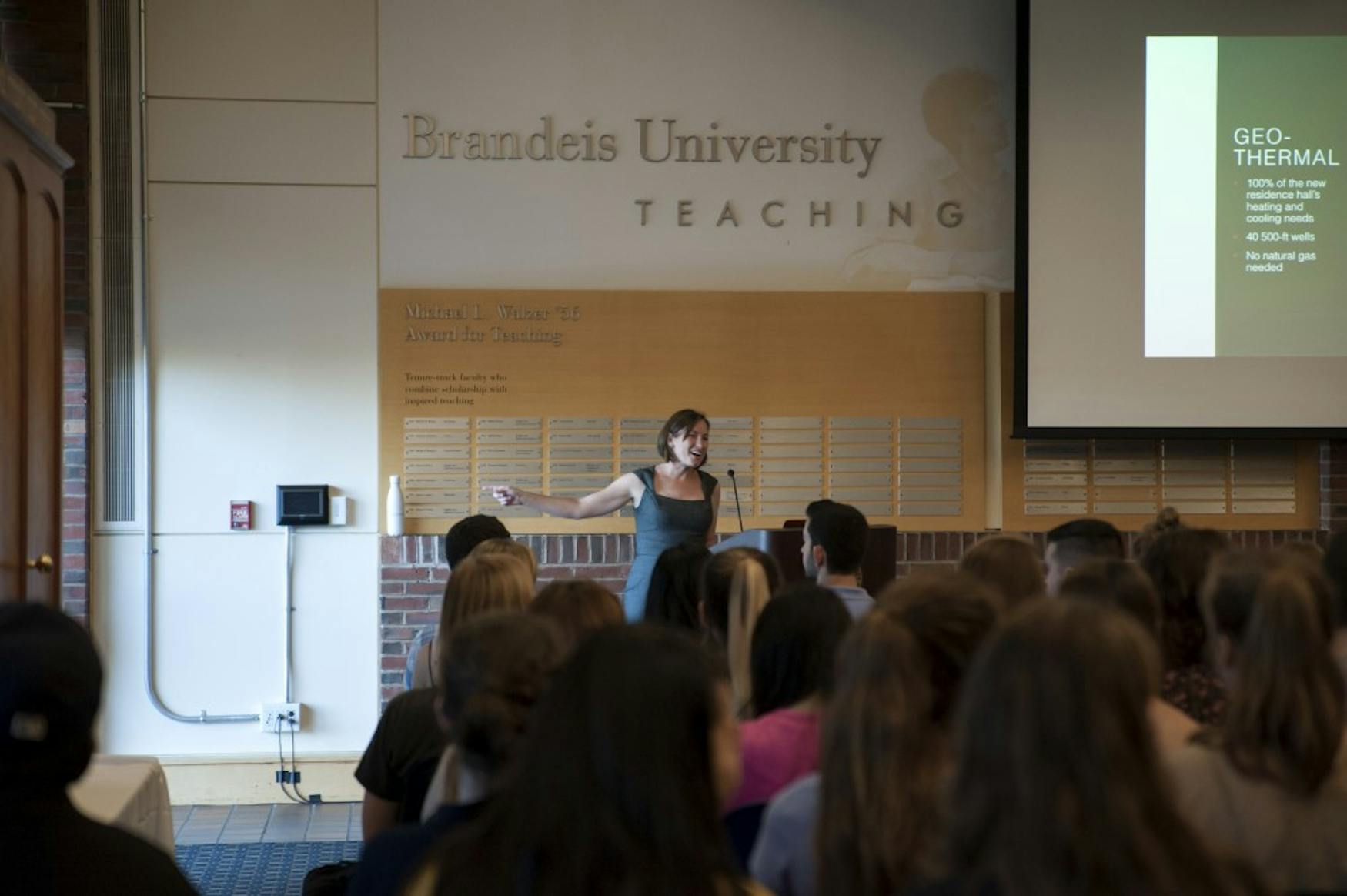Climate Change is in the Air
Students and faculty discussed how to make Brandeis more sustainable
Half a dozen professors, several faculty and 70-something students walk into a room. This is either the setup to a very convoluted joke or it’s the annual State of Sustainability Forum at Brandeis.
Last Monday, students, staff and faculty gathered in the Usdan International Lounge to meet and engage with all environmental groups on campus while learning about Brandeis’ latest sustainability efforts.
Senate Sustainability Committee Co-Chair Benedikt Reynolds ’19 opened SoS with a revelation. During the preparation meetings for SoS, he realized practically none of the club members knew their fellow clubs’ members or their goals. He felt embarrassed. “If we are all fighting for the exact same thing — if we are all fighting to make [a] positive impact on our school and environment — why don’t we know each other?” That is why they moved SoS from the end of the school year to the start: to inspire collaboration.
Sustainability Programs Manager Mary Fischer spoke next, bringing the audience up to speed on all things green at Brandeis. To meet the promises of “We Are Still In” (the pact President Liebowitz and 2,300 other U.S. university presidents, governors and mayors signed to commit to the Paris climate agreement), Brandeis has already taken steps to reduce energy, carbon, water and trash output while increasing clean energy use, composting and recycling.
For example, Fischer explained the residence hall being built to replace the Usen Castle won’t have even “one iota of natural gas for its heating.” Instead, forty five-hundred-foot geothermal wells will make the new building thirty percent more efficient than if it were built to regular building code. All of the old furniture from the Usen Castle has already been donated to a low-income city in Honduras — over 600 pieces of furniture, which amounted to 50,000 pounds of wood that avoided incineration, or 2 percent of Brandeis’ waste stream in 2016.
Fischer also mentioned sustainability measures like the upcoming installation of solar panels on Goldfarb Library, Shapiro Campus Center and Linsey Pool, which will produce nearly 600,000 kilowatt-hours of solar energy and save 200 tons of CO2 every year. She also spoke on matters regarding renewable fuel oil made from fryer grease, which will replace 10 percent of Brandeis’ natural gas use and an all-campus climate activism competition starting during Global Climate Change Week. The winning team in the competition will receive Patagonia gear.
Despite the progress made, Fischer reiterated that change doesn’t happen overnight. “I can’t press a button and make this happen. I need broad community buy-in. I need you.” Such examples of areas in need of improvement included turning off the lights in buildings at night, raising the recycling rate and reducing bottled water usage.
Prof. Laura Goldin (ENVS) spoke next, reflecting on the history of sustainability at Brandeis and how it brought her to the University in the first place.
She practiced environmental law for 25 years, “fighting the good battles and writing great laws,” before Brandeis invited her to be a fellow and teach the environmental law class.
Though she fell in love with Brandeis students and their dedication to social justice, the lack of environmental justice around campus appalled Goldin. In response, she and other environmentally-conscious faculty and members of Students for Environmental Action created an ad hoc committee called the Brandeis Environmental Sustainability Team. Before this, there was no Brandeis Sustainability Fund Committee, Manager or equivalent. There were only people who cared about environmental issues. Slowly, those people gained a voice on campus.
Goldin said she ultimately “Decided to stick [her] foot in the door and never leave.” She would go on to resurrect the Environmental Research Workshop course, now called Greening the Ivory Tower, from which many student projects still exist, such as DeisBikes, the Brandeis Rooftop Farm and TapBrandeis.
The Brandeis clubs and groups chatted next. They summarized who they were and what they do to make a difference.
Prof. Sabine von Mering (GRALL) was the last speaker. She summarized her work with FACT, the Faculty Against the Climate Threat, joking that it is made up “of the troublemakers of the faculty on campus.”
They are currently pushing both for fossil fuel divestment and to secure an environmental literacy requirement in the upcoming changes to Brandeis’ general University requirements.
She closed SoS by encouraging the audience, once more, to think about the ways in which they, individually, have the power to help stop climate change, from talking to non-environmental clubs, to becoming a vegetarian and everything in-between.



Please note All comments are eligible for publication in The Justice.